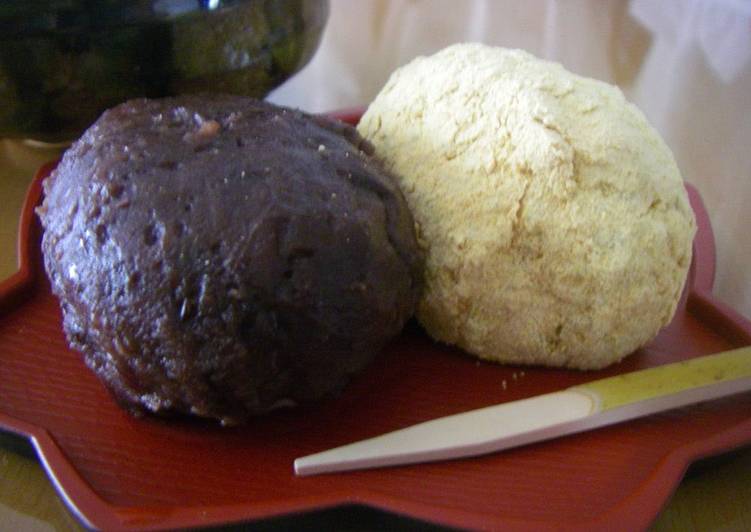Recipe: Delicious Our Family Recipe for Ohagi, Passed Down Over Three Generations

Recipe: Delicious Our Family Recipe for Ohagi, Passed Down Over Three Generations Delicious, fresh and tasty.
Our Family Recipe for Ohagi, Passed Down Over Three Generations. Pierogis, Three Generations Off the Boat. A large contingent of immigrants from Poland found their way to "My great grandmother came over on a boat from Poland," says Kelly Watts King. It's never too late to start a new family recipe tradition that you can pass down to your kids and grandkids.
My great aunt Laurie's banana black walnut bread, that mother made for years.
She would sell it during the holiday season, and while I enjoy a piece now and then, rarely make. love the black walnut flavor, but hate the smell of ripe bananas.
We are sharing all the answers for this game below.
You can cook Our Family Recipe for Ohagi, Passed Down Over Three Generations using 6 ingredients and 9 steps. Here is how you cook it.
Ingredients of Our Family Recipe for Ohagi, Passed Down Over Three Generations
-
It’s 250 grams of Dried azuki beans.
-
Prepare 300 grams of Sugar.
-
It’s 1 pinch of Natural salt.
-
It’s 300 ml of Mochi rice.
-
You need 200 ml of White rice.
-
It’s 1 of Kinako.
We would recommend you to bookmark our website so you can stay updated with the latest changes.
I bent over Victor and took his hand.
The man had lied to me.
Nat watched them, and he watched the sea-birds too.
Our Family Recipe for Ohagi, Passed Down Over Three Generations step by step
-
Rinse the adzuki beans and soak in a saucepan with enough water to cover. Bring to a boil and drain. Repeat this 2~3 times..
-
Combine the beans with 5 times the amount of water in the pan and bring to a boil. Then turn down the heat to low, and cook until the beans are tender. Add water from time to time..
-
This time, it took 1 hour and 40 minutes to cook the beans until they were tender. Now, you only need enough water to cover the beans. If there is too much water in the pan, discard. Then add sugar and salt. (Note: Dont add sugar before the beans become tender.) Cover and leave to stand overnight..
-
The next morning, cook over low heat until there is not much water left in the pan. Make the regular white rice first. For the mochi rice, rinse and soak in hour for 1 hour, then cook in a rice cooker with the same amount of water as youd use for regular rice..
-
When the water in the pot is almost gone, stay close to the pan! Stir with a wooden spatula gently from the bottom. Its done when the adzuki beans drop slowly from the spatula. Leave to cool down. Don't worry if you think it's too soft, because it will thicken up a bit when it cools down..
-
When the rice is cooked, mash while it is still hot, using a moistened wooden pestle. Mash the rice until it is still a bit lumpy. You wont waste any ingredients if you match the number of rice balls and anko portions. We always use kinako powder to use up the leftover rice..
-
For anko ohagi: Put a piece of cling film on your hand and put 1 portion of anko on top. Flatten the anko. Place a rice ball on top. Wrap the anko around the rice ball..
-
For kinako ohagi: Wet your hands and flatten a rice ball on your hands. Put a small portion of anko on top. Make a barrel-shaped rice ball using both hands. Coat with a loooooot of kinako powder. (We dont add any sugar to the kinako as it gets sticky after a while, but it's up to you)..
-
These are our pride and joy! We make a lot to share..
Down in the bay they waited for the tide.
Nat, tramping home across the fields and down the lane to his cottage, saw the birds still flocking over the western.
Our children and grandchildren are shaped by the genes they inherit from us, but new research is revealing that Over several repetitions, the mice associated the smell of cherry blossom with pain.
But if trauma is shown to be passed down the generations in humans in the same way as it appears.
Recipes brought over from the "old country" or even homemade recipes created by a great grandmother make excellent family traditions because cooking together Passed down stories, whether the stories are verbal or old paperback books, are great ways to pass down family values.

